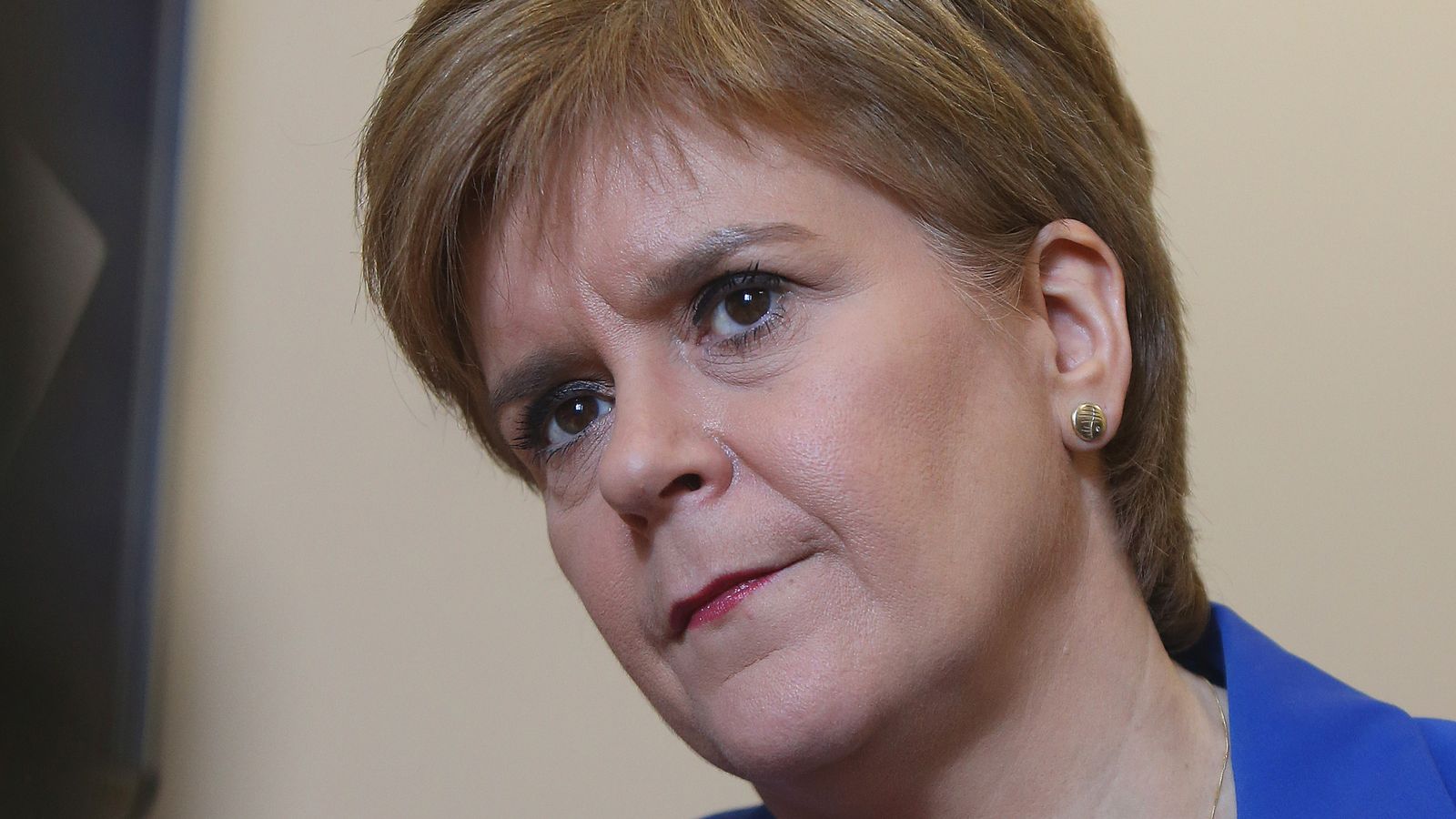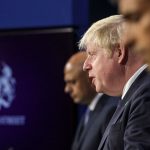Sky News can reveal further details contained in a report that found Scotland’s First Minister Nicola Sturgeon misled parliament.
Holyrood’s harassment committee also concluded that it finds it “hard to believe” she didn’t know of concerns around Alex Salmond’s behaviour before November 2017.
And committee members have included a passage in their report to say they are “concerned” at the length of time it took, in the wake of harassment complaints against Mr Salmond, for Ms Sturgeon to tell her top civil servant about contact with him on the matter.
Please use Chrome browser for a more accessible video player
The harassment committee has reached its conclusions by a majority vote ahead of the publication of its final report next week.
Members have decided that Scotland’s first minister misled the committee itself and, as such, misled parliament and potentially breached the ministerial code of conduct.
It has increased pressure on Ms Sturgeon to step down. Her opponents have repeatedly levelled the accusation that, in misleading parliament, she breached the ministerial code.
The code dictates that any minister found to knowingly be in breach should offer their resignation.
However, Sky News understands that the word “knowingly” was not included in the text agreed by the committee.
Its members decided by a majority that they were misled by the first minister.
She appeared before them earlier this month to give oral evidence and, before that, made a written submission in which she insisted she had not offered to intervene in a government investigation into harassment complaints made against her predecessor.
Please use Chrome browser for a more accessible video player
However, Mr Salmond insisted that she had, during a meeting at her house on 2 April 2018. His account was corroborated by Duncan Hamilton QC, his legal adviser, who was present at the meeting and wrote to the committee that Ms Sturgeon had said: “If it comes to it, I will intervene.”
Speaking to Sky News last night, Ms Sturgeon said: “I stand by all of the evidence I gave to the committee, all eight hours’ worth of evidence.
“What’s been clear is that opposition members of this committee made their minds up about me before I muttered a single word of evidence, their public comments have made that clear.
“So this leak from the committee – very partisan leak – tonight before they’ve finalised the report is not that surprising.”
The committee’s finding, passed by a majority, reads:
“The committee notes there is a fundamental contradiction in the evidence in relation to whether, at the meeting on the 2nd April 2018, the first minister did or did not agree to intervene.
“Taking account of the competing versions of the event, the committee believes that she did in fact leave Alex Salmond with the impression that she would, if necessary, intervene.
“This is confirmed by Duncan Hamilton, who was also at the meeting. Her written evidence is, therefore, an inaccurate account of what happened and she has misled the committee on this matter.
“This is a potential breach of the ministerial code under the terms of section 1.3 (c).”
Ms Sturgeon told the Scottish parliament that she first learned of complaints against Mr Salmond at the 2 April 2018 meeting. Sky News subsequently revealed an account by Geoff Aberdein, Mr Salmond’s former chief of staff, of a meeting four days earlier on 29 March 2018 that suggested the complaints were discussed then.
On that contradiction the committee found, by majority, that:
“The first minister’s failure to recollect the meeting (of the 29th March) and her account is at odds with Alex Salmond.
“The committee accepts there may be differing recollections of this meeting.
“It’s not in a position to take a view on whether the first minister’s version or Geoff Aberdein’s is more persuasive. It notes that the former first minister has the benefit of confirmation.”
On the first minister’s contact with her predecessor in the wake of complaints being made against him by two female civil servants, the Holyrood committee was “concerned”.
Ms Sturgeon had two phone calls and three meetings with Mr Salmond in 2018 after the complaints had been received. Having met Mr Salmond initially on 2 April 2018, it wasn’t until June of that year that she told her government’s permanent secretary about the contact.
The passage voted by majority in the committee’s report reads:
“The committee is concerned it took until the 6th June 2018 for the first minister to inform the permanent secretary of the fact of meetings (with Alex Salmond).
“Given the sensitivity, the committee believes it was inappropriate for the first minister to continue to meet (Alex Salmond) on this topic.
“She should have made the permanent secretary aware as soon as possible after the 2nd April 2018 meeting, at which point she should have confirmed she would cease contact with Alex Salmond.”
Committee members were given evidence during their inquiry from civil service unions who expressed concerns of bullying behaviour in 2010 around the office of the then first minister, Mr Salmond.
Their findings state:
“The committee finds it hard to believe that the first minister had no knowledge of any concerns about inappropriate behaviour on the part of Alex Salmond before November 2017.
“If she did have such knowledge, then she should have acted upon it. If she did have such knowledge, she has misled the committee.”
Please use Chrome browser for a more accessible video player
Holyrood’s harassment committee, comprising 4 SNP MSPs and five members of the opposition, is due to publish its findings, in full, early next week.
Their inquiry has been looking into the Scottish government’s mishandling of a 2018 investigation of harassment complaints against Mr Salmond.
He challenged its legality and a court ruled that it was “unlawful” and “tainted by apparent bias”. Mr Salmond was subsequently acquitted of sexual assault charges at a criminal trial in March 2020.
The remit of the Holyrood committee has been to consider and report on the actions of the first minister, Scottish government officials and special advisers.
It has examined the development of the government’s policy regarding harassment, events surrounding Mr Salmond’s judicial review and the handling of complaints as well as matters concerning the ministerial code.
Ms Sturgeon is facing a separate inquiry into whether she breached the ministerial code.
James Hamilton, Ireland’s former director of public prosecutions, is due to publish the findings of his investigation in the coming days.
Mr Hamilton is an independent adviser to the Scottish government on the code and has been conducting enquiries following Ms Sturgeon’s self-referral amidst questions surrounding what she knew, and when.






















